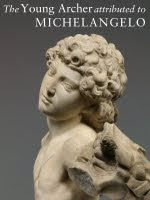The inanity of Youtube comments is legendary, but this one is pretty high up there:
i went to see this this past weekend.. was prob the most interesting part of the whole museum..
The "this" in question? The
current Picasso exhibit at the Metropolitan Museum of Art. It's a comment on Thomas Campbell and Gary Tinterow's
video tour of the exhibit. There's so much at the Met. This is not the most interesting thing going on there! It's not even that special as an exhibition of Picasso's work, being a show just of works already in the Museum's collection.
On a recent visit, I found
Side by Side: Oberlin’s Masterworks at the Met to be particularly fascinating. More on that in a future post, I hope.
But first,
here's a bit of media from the Met's web site that I did really like.
In an MP3 podcast, curator James Draper discusses Michaelangelo's "Young Archer": how it was rediscovered and how it ended up on display at the Met.




